
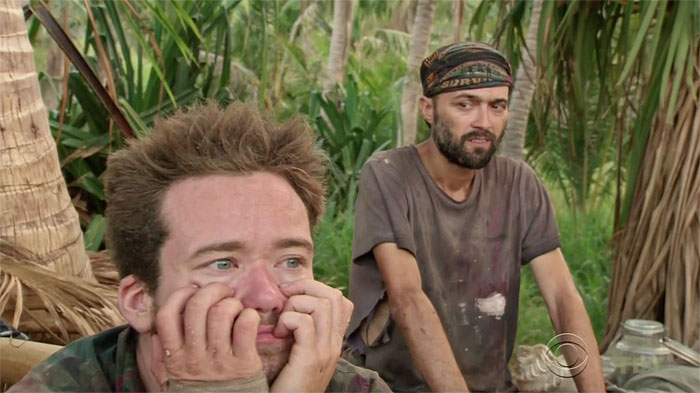
These two episodes (fine, go ahead and give them a single title and insist it's just one episode, CBS, we're not fooled) were perhaps this season's strongest. And just as they did in Cambodia, the network's programming geniuses plowed through them both on one of the least-watched nights of the year, Thanksgiving Eve. We complained about that when it happened last year. Those were the two lowest-rated Survivor episodes, ever. And so... they did it again this year. Lesson learned: CBS actually doesn't care.
This is a spectacular waste of great contestants, great production values, and the heart of an overall great season. Big Brother was given 14 weeks of airtime this summer. Survivor was given 13 this fall. Apparently there was a tremendous need to take that extra week away from Survivor so that Undercover Boss could pull in about a third of Survivor's audience? Okay, then!
It's an issue that probably seems quaint in the age of one-time dumps of complete full-season original content for streaming on Netflix. That model is probably the future of all viewing. But it's not a one-size-fits-all solution. There are some series, scripted and unscripted, that have episode-to-episode twists and turns. For the audience, discussion of these season-long narrative elements as they are revealed enhances the viewing experience. If "puzzle box" shows like Westworld or LOST had been released all at once, would they have inspired as many obsessively researched viewer theories? Probably not, and the same goes for weekly elimination reality competitions like Survivor, where winner pools and reading the edit are still spectator sports, 33 seasons in. As was the case in Cambodia, these two episodes could have benefitted from a more measured release. Maybe someday, CBS will realize that. (But don't hold your breath.)
In praise of baiting Adam with sit-outs
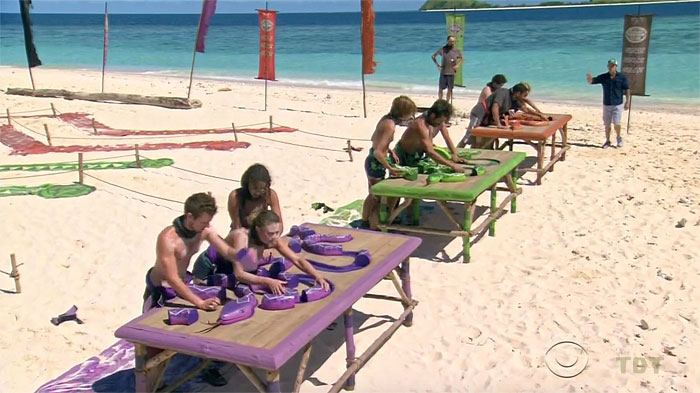
Both reward challenges in these episodes were arranged in such a way that one person sat out each time. On the first viewing, this made zero sense, particularly in the second RC, where 10 players left, which creates a fairly obvious 5-5 split, not to mention a format they'd just used during the previous hour. Even more head-scratchingly, the first RC doomed the non-participant (Jay) to have no chance of receiving reward, while the second one guaranteed the lucky recipient of the odd rock (David) a seat on the chopper to the reward feast. What on earth were they thinking?
And then Adam gave his confessional about weighing whether or not to use his reward-stealing advantage to take away David's unearned victory trip, and it all made sense. It didn't work out the way the show wanted, because Adam chose to hold on to his "advantage" and not play it. But clearly the intent was to provide Adam a golden opportunity in which to steal a reward from someone who hadn't done anything to earn it. Obviously he couldn't, because he was more or less in an alliance with David, and probably didn't want to create an incident, and as he stated, he also wanted to hold on to the advantage in case it could be used for something better down the line.
Still, cleverly played, production. Completely avoiding individual reward challenges is still not great, but this particular oddly configured team challenge was worth a shot.
Blow the blowout out your ears
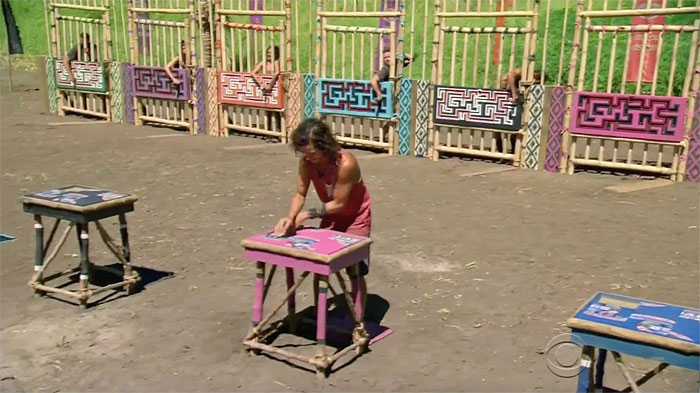
Having dispensed with the praise, WTF with the slide puzzle in the second immunity challenge, John Kirhoffer? It's bad enough that almost every individual immunity challenge since San Juan del Sur has been an excruciating balance/endurance snoozefest, but you finally add a puzzle element to a challenge, and it's a slide puzzle? And not just a slide puzzle, but an exceptionally easy one? To the surprise of what should be no one, Jay solved an 8-piece slide puzzle in mere seconds, allowing zero other contestants to exit their cage before he finished.
We object not just because the puzzle was lame (it was), but also because it cheapened the impact of what was a brilliant first element: a vertical table maze that the contestants had to negotiate purely by touch and memory, because they couldn't see it. That part alone would have made an inspired, exciting challenge (even if it was difficult to tell who was in the lead, and as Jeff Probst himself noted, he wasn't about to fill in the audience, lest the contestants hear). Had they stopped it there, it would have been a great challenge. But the half-hearted "wait, someone else might catch up" attempt with the slide puzzle was a huge letdown. Hopefully the slide puzzle was a last-minute substitution or add-on, because we can't imagine it was extensively tested.
By the numbers: Team vs. individual challenge threats
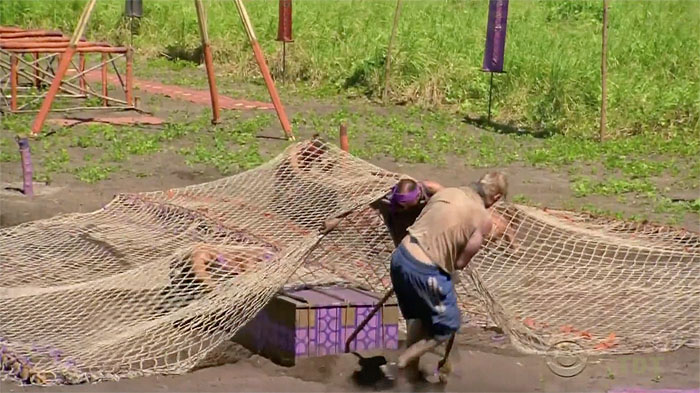
The traditional post-merge frenzy of booting challenge threats has more or less continued this season, with Michelle, Taylor, and Chris all going out in succession. But as has been widely noted, including by Chris in his exit interviews, modern post-merge immunity challenges are almost all balance and endurance contests. There hasn't even been a single puzzle (unless you count the slide puzzle above, which we don't). In fact, Chris may be the textbook example of a contestant who was a challenge beast on the size/athleticism/strength-favoring tribal challenges, but utterly hopeless in the individual balance-fests that dominate the post-merge. To be fair, his being targeted here was more likely due to his being the leader of the original Gen X majority alliance than to challenge performance. But that performance is notable:
Several tribal/team challenges were won almost single-handedly by Chris this season (the Ep4 RC, "Water Slaughter"; the Ep7 RC, "Matt Finish"; the Ep9 RC, "All Mixed Up," to name but a few). For "All Mixed Up" (shown above), Probst praised Chris for his team-picking acumen, but the fact that Chris was able to haul the heavy chest under the net practically by himself seemed to be a bigger factor in his team's success. Unless you think David holding up the net was the difference-maker. In contrast, in three individual challenges, Chris finished: 12th out of 13, a respectable 5th/10, and 8th/11. That gives him a paltry 39.5% Mean % Finish in individual challenges, which is historically poor (edging out Guatamala's Lydia Morales for 30th-worst all-time, by mere hundredths of a percent).
But hey, he still did better than Scot Pollard. So there's that.
The ugliness at the rocks Tribal - theater?
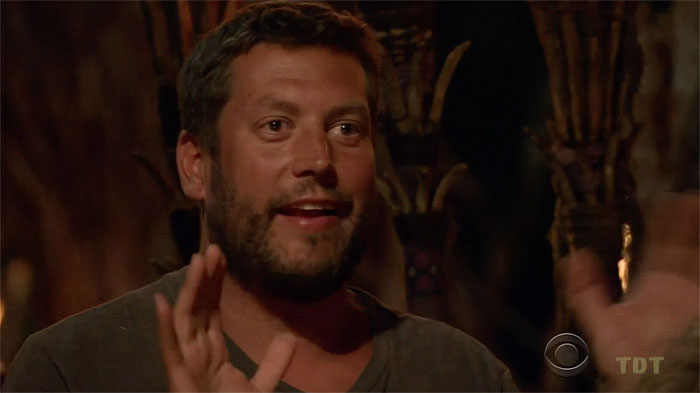
Bret and Zeke had multiple great moments in these two hours - starting with their illuminating discussion of the generational differences they faced as gay men in coming out (or choosing to remain closeted), but also Bret encouraging David to participate in the first reward challenge's rock draw, and Zeke's solid reads of his alliance falling apart around him. Both men were deeply rootable (emphasis past-tense).
So it was deeply concerning when both condescendingly belittled David at the second Tribal Council. Bret mincingly waved his hands and wailed "Oh! Now I've gotta cry because I've got anxiety!" and Zeke chimed in with "Oh, don't cry David! Are you getting called out? Is this affecting your journey?" Bret also angrily denounced the continued usage of Hannah's "trust cluster" phrase, and snapped "Ken, this is the game, welcome to it" when Ken expressed bewilderment at everyone's degree of confusion. All of this was both awful in the moment, and on further reflection... extremely odd. Given that both Bret and Zeke have improv experience, were they simply "acting" (up) in order to drive the action?
The reasons for doing this were not immediately clear, but presumably it was all intended to rile David up and goad him into playing his idol. (For himself?) Bret and Zeke had both been shown discussing David's idol, so they certainly had to have been thinking about it. If so, it worked: David did play his idol, albeit incorrectly. Was it to drive a wedge between the two factions, and lock in the tie? Zeke was personally saved by the deadlocked tie, and probably knew he didn't have six votes on his side heading into Tribal. It seems plausible that this was all... if not scripted, at least outlined.
Still, especially given that Bret tossed a sarcastic "Sorry, Jessica, I didn't want to go to rocks! ... David did!" at the victim on her way out, it's hard to believe it was entirely performance. And even if it were, do those ends justify their meanness? Bret and Zeke were making personal attacks. Was it part of the game? Were they just being lame? Were they possessed by the spirit of Rocky from the first season filmed in Fiji? Who knows?
But if this is changing the game, please return it to its upright and locked position.
On the rocks
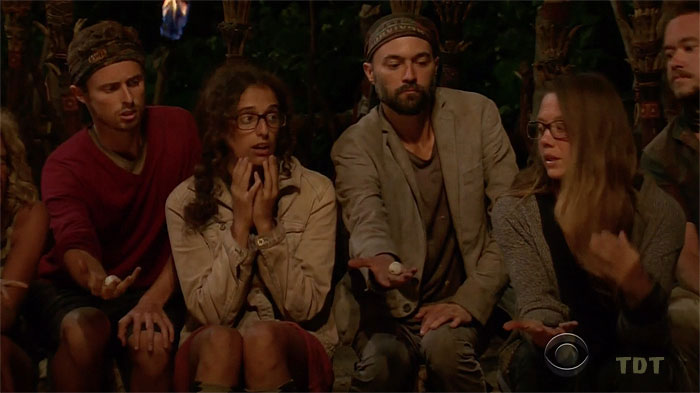
Statistically speaking, going to rocks was not that bad a choice individually for the six participants. Both alliances were equally represented, three vs. three, and each person pulling a rock only had a 1-in-6 chance of leaving. But for that one person who did go home (Jessica, obviously), it seemed exceptionally tragic: She hadn't really wanted to vote for Zeke in the first place, but felt obligated to work with David because he'd saved her with his idol back on the Gen X tribe. Then when she was being lobbied to change her vote on the re-vote, the decision seemed particularly fraught, since she didn't really have any particular connection to Hannah or Zeke.
Still, had she flipped to Zeke's side, she'd be abandoning her only two true alliance-mates in Ken and David, in order to side with three of the people who'd just voted for her at the previous Tribal Council (Bret, Sunday, and Jay). So flipping wasn't really an option. And we all know how not flipping worked out. (Conveniently, the one potentially flippable vote, Will, was seated on the extreme end, where nobody in the opposing alliance could talk to him.)
All in all, there was no winning choice available to Jessica. It's especially sad because Jessica seemed much more invested in the game that two previous victims: Paschal English was probably hours away from becoming a medevac in Marquesas, and Katie Collins had already lost her whole original alliance, and was simply forced into a last-ditch attempt to stay in the game in Blood vs. Water. Jessica, in contrast, was in the dominant three-fifths of what had been the dominant alliance, if not for this tie.
Every good Survivor player recognizes that in addition to skill, winning the game requires a high degree of luck. Sometimes losing the game breaks down to just that as well.
S33: MvGX Episodes 10-11 recaps and commentary
- Gordon Holmes at XfinityTV.com: "All the Wright Moves?"
- Dalton Ross at EW.com: "Million Dollar Gamble" (recap)
- Dalton Ross & Jeff Probst at EW.com (Q&A)
- Andy Dehnart at Reality Blurred: "Survivor's Thanksgiving episodes delivered delicious drama"
- Stephen Fishbach at People.com: "Threat Level Midnight"
- Martin Holmes at YahooTV: "It's About to Get Bloody!"
Exit interviews: Chris Hammons
- Gordon Holmes at XfinityTV.com (11/28/16): "Chris: 'It Was Zeke... That's Very Tough to Deal With'"
- Josh Wigler at Parade.com (11/28/16): "Chris Hammons Was 'Very, Very Angry' After His Blindside"
- Rob Cesternino at RHAP (11/28/16): "Exit Interview | Latest Players Voted Out - 11/28/16"
Exit interviews: Jessica Lewis
- Gordon Holmes at XfinityTV.com (11/29/16): "Jessica: 'I Knew I Wasn't Going to Win If I Flipped'"
- Josh Wigler at Parade.com (11/28/16): "Jessica Lewis Defends Her Rock Play"
- Rob Cesternino at RHAP (11/28/16): "Exit Interview | Latest Players Voted Out - 11/28/16"
 Jeff Pitman is the founder of the True Dork Times, and probably should find better things to write about than Survivor. So far he hasn't, though. He's also responsible for the Survivometer, calendar, boxscores, and contestant pages, so if you want to complain about those, do so in the comments, or on Bluesky: @truedorktimes
Jeff Pitman is the founder of the True Dork Times, and probably should find better things to write about than Survivor. So far he hasn't, though. He's also responsible for the Survivometer, calendar, boxscores, and contestant pages, so if you want to complain about those, do so in the comments, or on Bluesky: @truedorktimes
- Recaps index
- Cast projections
- Ep.1: A Whirlwind of windbags
- Ep.2: Love and doctors
- Ep.3: Summit of groans
- Ep.4: The Wright move
- Ep.5: Three strikes
- Ep.6: Free of shipping
- Game 7: The Cubs, stats, and Survivor
- Ep.7: Smoked by Jay
- Ep.8: The Millennials find their goat
- Ep.9: Game changers?
- Eps.10-11: Wasted opportunity
- Ep.12: From Adam to Zeke
- Ep.13: Fun, painful, beautiful, amazing
- Pre-Ep.14: Jury jeopardy
- Ep.14: Adam's evening